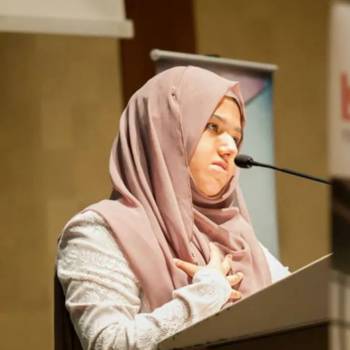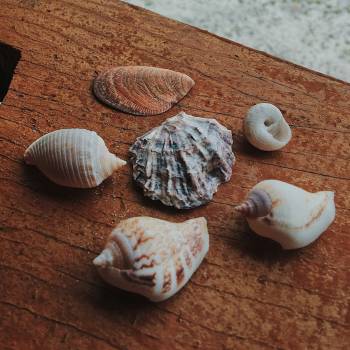As a writer with a disability based in Hong Kong, I was delighted to come across ‘The Autism Cafe Project’ that is based in Malaysia. I had a conversation with the founder to not only learn about the project, but mostly show-case the contributions of individuals with autism within the Malaysian community.
‘There must be an insightful story there,’ I thought.
‘There must be lessons for our community to unpack, learn, and treasure,’ I pondered.
Below depicts 8 questions from the conversation I had with the founder of ‘The Autism Cafe Project’–Adli Yahya–who is a father of 6 with a degree in business administration. His 23-year-old son, Luqman, is the backbone story as to how and why the Autism Cafe Project emerged. Luqman is an individual with autism that has flourished and grown by actively contributing within the Autism Cafe Project. He–along with his peers that have autism–have been reshaping the narrative of life with autism in Malaysia by showing the potential to develop skills and lead life to the fullest.
I hope that Qalby Readers enjoy reading the conversation that I had with the founder, and take the time to visit the Autism Cafe Project and be part of its thriving community.
A conversation with Adli Yahya, founder of the ‘The Autism Cafe Project:’
1. What is the backstory behind the establishment of the Autism Cafe Project?
This project was started because when you have a child with a disability, there is the question of what is going to happen to the child when parents are not around. Luqman was born 23 years ago, so one can imagine the level of awareness within the community on what autism was almost 2 decades ago. It was difficult because there was not much awareness of autism. The level of awareness was not where it is now. There was the general struggle on acceptance as a parent.
You can physically see if someone is blind, or if one has down syndrome, but with autism it is harder to physically detect. Autism is an invisible disability. Your child with autism might move around more, so one can sense there is something different from the norm, but one may not necessarily pinpoint what it is.
Back in 1999, or 2000, there was the general need to understand autism and accept. There was stress at first, especially with schooling. Montessori is meant for children with learning difficulties, but some teachers might not have known that. Some Montessori schools turned down admission. This is largely due to the general lack of understanding and awareness of autism within the community.
There was later acceptance at a school, but then there was the worry that children with disabilities might not be able to live life to the fullest ability, because of the lack of supporting environment within the community. There was the prevalence of general lack of awareness. Public schooling was tried but that was not a success, that during teenage years, the worries as a parent only grew.
There was then the decision that–as a parent–one cannot leave the integration nor development of a child with autism within the community to anyone else. There may be teachers, mentors, and doctors, but parents ultimately need to take things into their own hands for the overall wellbeing of the child.
Parents naturally think about what to leave behind for a child, so there was the realization that something had to change to promote developmental growth as well as acceptance for my son, Luqman, who has autism. There was the need to create opportunities for him within the community.
This was how the Autism Cafe Project emerged.
This project was originally meant for my son, Luqman, as a non-profit organization cafe. The project does not thrive for making profit but rather thrives to support development of social living skills. The living skills of individuals with autism could then allow them to live their lives to the fullest.
This is what the project is all about.
It first started off small with both my wife, I, as well as our son Luqman.
There are so many parents in a similar boat out here.
Autism is a spectrum.
Some may be high functioning that can play instruments but that does not necessarily mean that all do.
All with autism deserve support to maintain a job, but since there might not be support for all individuals with autism, there is a need to create opportunities.
The cafe is a place to create opportunities.
Luqman has bloomed through the Autism Cafe Project–he can make bracelets on his own and sell them, too.
The most important aspect is learning independent living such as cooking, cleaning the plates, and tidying up. He is able to do that as well as make his own living which would make any parent proud.
2. What is the main vision and message of the Autism Cafe Project for the community?
The Autism Cafe Project is a platform for individuals with autism to live their life to the fullest. It is a means to provide them opportunities to contribute and develop their skills.
There needs to be support to accommodate individuals with autism to live life to their fullest. We have to assist and open up windows of opportunities. The Autism Cafe Project is the window of opportunity for them.
An individual with autism might be able to make thousands of bracelets, or cookies, but what is the point without granting assistance to sell it. We have to give individuals with autism the support to earn their own living and gain their own independence.
The Autism Cafe Project has utilized social media to show the abilities of individuals with autism and also show how to support them secure their future by living life to the fullest.
The Autism Cafe Project’s social media posts are mostly about individuals with autism living their lives to the fullest. This could be them setting up a booth, making cookies, or even donating to orphanages.
The Autism Cafe Project is also a message to parents that parents need to create the setting for children to build their future. Parents taking charge as those that understand and accept their children gives children a more secure future.
3. Everyone has value and potential - may the Qalby community learn about the key leadership qualities from our youth with Autism that have been running the cafe?
There is a buddy-system within the cafe.
Autism is a spectrum so every individual with autism might be different from the other.
There is so much love within them.
Individuals with autism may struggle with communication.
This buddy-system consists of pairing certain individuals with higher function with others with autism that may not be as high functioning. The higher functioning individual with autism would lead. Both would support each other in building each other’s confidence. They would encourage each other to complete each task as expected, such as cleaning up the table.
An example:
If you request to clean up the table by pointing at a plate, one plate might just be cleaned up instead of the whole table. It helps to have other individuals with autism explain how a task was intended for completion.
Leadership is built up by helping each other out.
Our youth with autism would help each other attend prayers by sometimes holding the hands of the other.
Leadership qualities do appear especially if you cultivate them nicely.
Some individuals with autism that previously worked at the cafe have secured good working positions outside the cafe. We encourage them to integrate within the community.
4. What are the common misconceptions regarding autism within the community?
The general public in Malaysia tends to understand individuals with autism at both extremes. Some might assume an individual with autism are those that may be high-strung with tantrums. Some might say that they witnessed someone having meltdowns out of nowhere and that is what is expected from individuals with autism. Some assume that one may hurt themselves for no reason or not be able to work. On the other hand, there are some who believe that individuals with autism have extraordinary talent, such as being able to paint or converse in 5 languages.
Many do not know that generally–around 80%--individuals with autism can also be somewhere in the midpoint.
When you have that extreme perception, it can affect the rest of the autistic community.
The assumption that individuals with autism are hard to get along with impacts daily lives, especially if employers have that misconception. It, therefore, makes it very difficult to secure jobs. On the other hand, if there is the impression that individuals with autism are extraordinary, this gives room for the assumption that individuals with autism do not need support.
The perception must be corrected.
The Autism Cafe Project tries to promote that individuals with autism may have ordinary talent and that we need support to commercialize it.
An example:
My son, Luqman, loves water.
There comes the question of how to utilize the love of water to make a living, such as washing the dishes which consists of water.
5. What are the common barriers faced by our brothers and sisters with disabilities within the community?
Misconceptions due to stereotyping to both extremes.
6. What are the potential harms for categorizing people with disabilities or individuals with autism?
A potential harm is putting someone in a box through assumptions, because when you put someone in a box, you cannot do justice towards them.
7. How can individuals without any exposure to disability from the Malaysian community be a supporting friend towards people with disabilities within Malaysia?
The community can support by largely engaging with the services run by The Autism Cafe Project.
If there are any social gatherings, use the Autism Cafe Project’s catering service. It would allow individuals with autism to serve and also have exposure. It will give you the chance to get to know them, too.
It is a chance for you to befriend individuals with autism at the event.
During Jummuah prayer, if there are lunch boxes needed to distribute, choose to engage with the Autism Cafe Project for distributions.
It allows the Autism Cafe Project to be further sustainable and promote integration within the community.
Come over to the cafe and spend a couple of hours.
Make cookies together and crafts.
This is how you promote inclusion.
A lot of individuals with autism want more friendships. Invite them over for a movie or treat them. Mainly start talking with them. Windows of opportunities can be created.
Some individuals with autism may not be able to organize picnics but the community can.
Individuals with autism mostly need to be understood.
8. What are the recommended best-seller drinks and food from Autism Cafe’s Project Menu? The Qalby team would hope to visit, and I know whenever I visit Malaysia, Autism Cafe would be the top must-go-to-places.
There is a half-Italian and Egyptian chef that has a son with autism.
The Autism Cafe Project normally produces Egyptian and Italian dishes.
Distribute menus on social media later next month for the public to see.
Can whatsapp orders and accept online payments.
Be sure to support by showing up and being part of the autism cafe project community.
The Autism Cafe Project Facebook: https://www.facebook.com/Autismcafeproject
The Autism Cafe Project Instagram: https://www.instagram.com/autismcafeproject
The Autism Cafe Project Whatsapp: +60 12-349-0813
Writer by-line: Sa’diyya Nesar is the author of ‘Strength from Within,’ TEDx speaker, and poet that lives life with physical disabilities. Chapter 1 of her upcoming book can be downloaded at: www.sadiyyanesar.com
 Sa'ddiya Nesar
Sa'ddiya Nesar 




